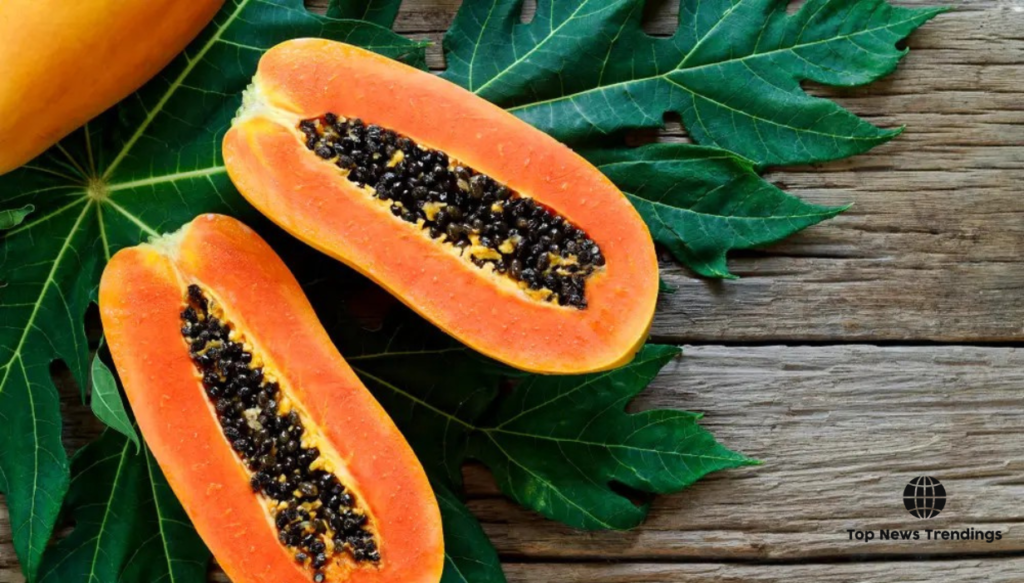Papayas are high in beta-carotene, vitamins A and C, and have a texture like a melon,” said registered dietitian Julia Zumpano, RD, LD. Other nutrients include
Unfortunately, it is this alternate slice of sweet, sunny papaya that gets one to enjoy that tropical taste without getting out: “Papayas are highly beta-carotene and vitamins C and C-rich, and they have a texture very much like that of a melon. Other nutrients,” said registered dietitian Julia Zumpano, RD, LD. “The fruit’s crunchy black seeds can even be eaten.”
And papaya may help protect vision, fight disease, prevent inflammation, improve gut health, lower blood sugar, and protect your heart. In fact, Zumpano outlines all the ways papaya can do all these things for your health.
What is a papaya?
Early European explorers said “tree melons” for the papayas-the fruits look a little watermelon. However, papayas are berries. These fruits grow on tree-like plants that normally live in tropical regions like Mexico, India, and Central America. The papaya plant flourishes in some warm areas of the US, such as California, Florida, Hawaii, Texas, and Puerto Rico. They are among the most consumed tropical fruits along with pineapples, mangoes, and bananas.
Papaya nutrition
A very small papaya of 157 grams gives:
67 calories
0.7 grams protein
0.4 grams of fat
17 grams carbohydrates
2.6 grams fiber
12.3 grams total sugar
Other nutrients include:
95.6 milligrams vitamin C
31.4 milligrams calcium
33 milligrams magnesium
15.7 milligrams phosphorus
286 milligrams potassium
Which benefits of health does papaya provide?
Papayas makes fruit a nutritious addition to meals in Vitamins and antioxidants. Papayas provide a lot of promising health benefits.
1. Protects Eye
“Eye health depends on these nutrients.” A meager 68 micrograms of vitamin A can be found in one cup of sliced papaya, which is about 33% of the daily value (RDV).
2. Fights Diseases
This small papaya will provide 95 milligrams of vitamin C that meets and exceeds the recommended DV. Since your body does not produce this water-soluble vitamin, you must have vitamin C in your diet every day.
Studies show that a high intake of vitamin C foods reduces the risk of lung and breast cancers. Also, it can help in treating patients with pancreatic cancer, it has also been noted. On the other hand, such phytonutrients like lycopene present in papayas have some protective effect against cancer.
Vitamin C also helps your body with other functions:
Protective for the eye L
Keeps joints healthy
Makes collagen for hair, nails, and skin in good shape
Promotes healing of the wound
3. Prevents inflammation
Papaya has an enzyme- papain- that reduces oxidative stress.
“Oxidative stress occurs when you don’t have enough antioxidants to fight free radicals,” Zumpano explains. “The damage to the cells that then results can give way to chronic inflammation, thus increasing your risk for getting any health issues.” A tiny study review shows that the phytonutrients and the extracts in papaya might protect against:
Aging
Alzheimer’s disease
Cancer
Diabetes
Gum diseases
Chronic inflammation
4. Increase gut health
Studies prove that fermented papaya may increase gut health. Naturally fermented foods contain probiotics for a healthy gut microbiome. “Probiotics are healthy bacteria that aid digestion and fight inflammation”, Zumpano says.
5. Decrease blood sugar
The fermented papaya lowers blood sugar (glucose) levels. This could prove beneficial in case of prediabetes. The warning, however, is that it would not be advisable for an individual on insulin or oral diabetic drugs.
“You could end up with blood sugar that’s too low, also known as hypoglycemia,” Zumpano warns.
6. Heart protective
One little papaya, sliced, boasts 286 milligrams of potassium. This is about 6% of the recommended DV. “Foods high in potassium help relax blood vessels thereby improving blood flow and blood pressure levels,” Zumpano states.
“The vitamin C present in papaya reduces high blood pressure by reducing oxidative stress and inflammation. Moreover, research shows that the lycopene in papaya may help prevent heart diseases and strokes by lowering bad cholesterol (low-density lipoprotein or LDL)”.
Any risks eating papaya?
Yes, some people with conditions may want to opt for other fruits. They include those who:
Are latex-allergic. Unripe papayas have high levels of papaya latex made of papain enzymes. A latex-allergic person who eats papaya could experience an allergic reaction (oral allergy syndrome) to this natural latex. “The latex enzymes can irritate and damage the esophagus and gums,” cautions Zumpano.
Have an asthmatic condition. According to studies, papain enzymes in papayas can stimulate breathing troubles among asthmatics.
Read also: 5 Effective Ways to Fix Blood Sugar Issues Despite Diet and Exercise

